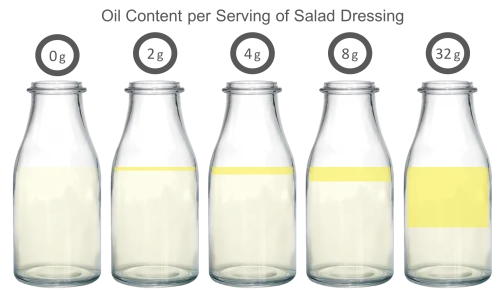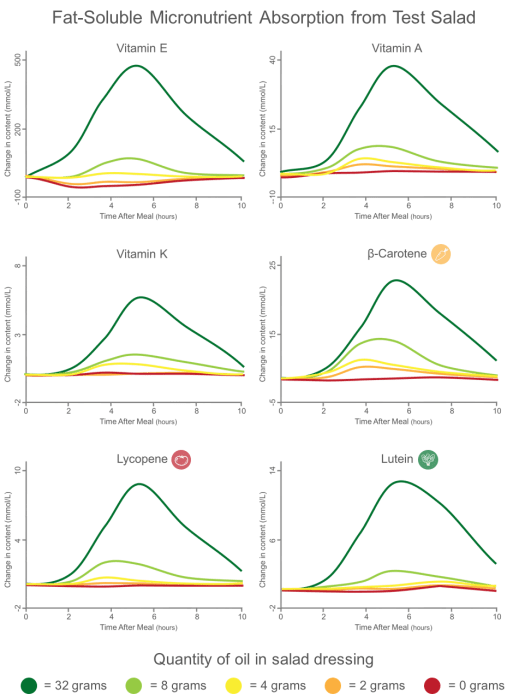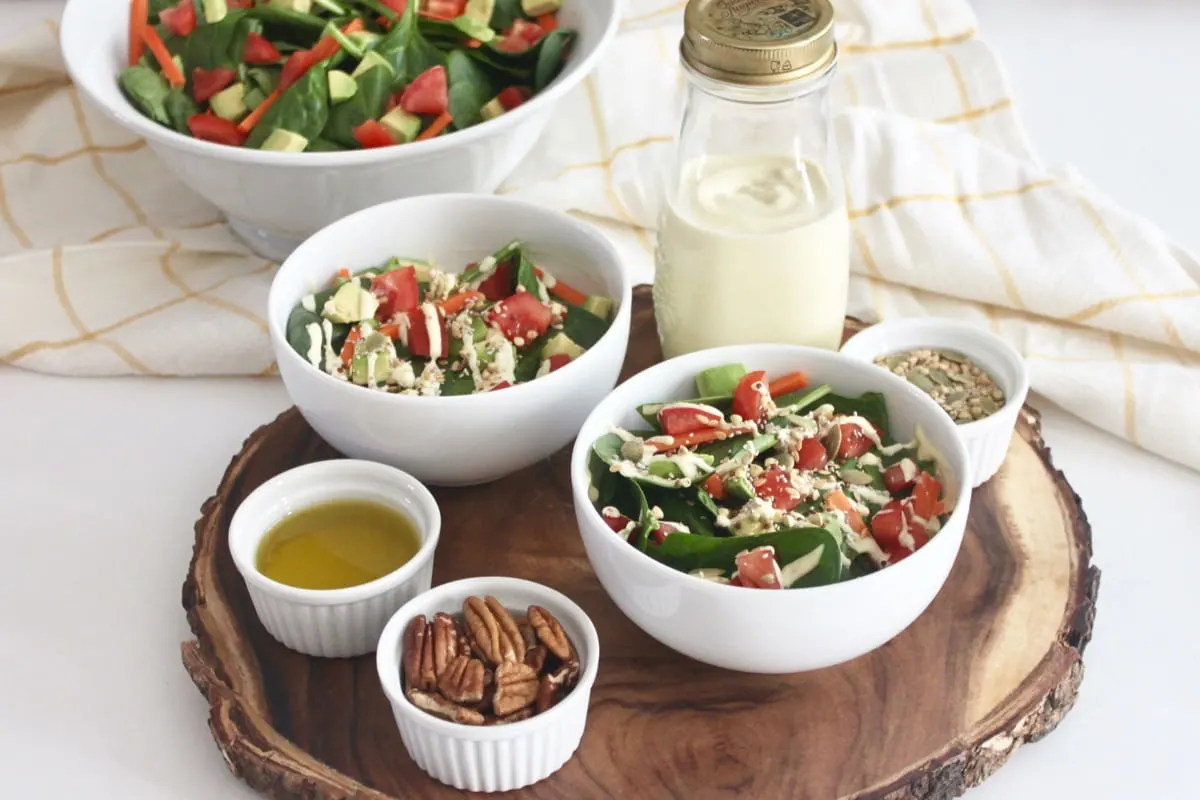If you eat salad with a low-fat or non-fat dressing, you may be missing out on some key nutrients. Research has shown that including fat in your salad, usually in the form of salad dressing, helps your body absorb fat-soluble vitamins. But how much fat do you need to absorb these micronutrients?
Scientists from Iowa State University recently published a study evaluating how different amounts of oil in salad dressing influence the absorption of fat-soluble vitamins and other micronutrients from the salad.1 Specifically, they found that there is a proportional relationship between the amount of oil in a salad and the quantity of fat soluble vitamins absorbed. If your salad contains more fat, your body will absorb more micronutrients from the vegetables.
Healthy salads need some fat
Let’s start with the basics of the study. Participants were fed identical salads, in different orders, on five separate occasions. The only difference in the study meals was the amount of oil in the salad dressing. Specifically, the dressings contained 0, 2, 4, 8 or 32 grams of soybean oil. All salads contained spinach, romaine lettuce, shredded carrots and cherry tomatoes.

After the participants ate a salad, the researchers collected blood samples to measure the quantity of absorbed fat-soluble vitamins and other micronutrients. They measured the amount of common fat-soluble vitamins including Vitamin A, Vitamin E, Vitamin K and micronutrients including lycopene (from tomatoes), lutein (from green leafy vegetables) and β-carotene (from carrots). The vitamin absorption of the participants in the study was as follows:

Salad dressings with more fat enhance absorption of fat-soluble vitamins from your salad
The above graphs show that consuming salads served with the high oil dressing resulted in the highest absorption of fat-soluble micronutrients. By contrast, eating a salad with a fat-free dressing resulted in essentially no fat-soluble vitamin absorption. Fat is needed to “unlock” the fat-soluble nutrients in vegetables.
It is worth noting that the amount of each nutrient absorbed was highly individualized for each participant. The amount of oil in the salad dressing required to achieve a similar nutritional benefit was different for each person in the study. With this said, the trend was always the same with each participant. There was a proportional relationship between fat-soluble micronutrient absorption and quantity of oil in the test salad dressing.
But aren’t we supposed to limit the amount of fat we eat?
Yes and no: it depends on the type of fat.
In 2015, the Dietary Guidelines for Americans was updated to remove recommendations regarding daily total fat intake.2 However, the revised Dietary Guidelines do recommend avoiding trans fats completely and limiting saturated fats to less than 10% of your daily calorie intake.
So, as long as the fat is a healthy fat, feel free to enjoy some full-fat dressing with your salad.
How much fat should I add to my salad?
This study showed that eating a salad with 32 grams of oil resulted the maximum absorption of fat-soluble micronutrients. That is more than 2 tablespoons of oil. Note: The typical serving size for a salad dressing is 2 tablespoons.
This doesn’t mean that you need to or should consume salads containing 32 grams of oil. Each study participant need a different amount of fat to absorb the same level of micronutrients. So, a good goal is to eat salad with a serving of a healthy salad dressing and include another good source of healthy fats such as nuts, seeds, or avocados.
Key takeaways to maximize vitamins from veggies
1. Skip the no-fat or low-fat salad dressing options
You can not unlock the full nutritional benefits from eating a salad if you add a dressing that contains little or no oil. Also, low-fat and non-fat salad dressings are more likely to contain excess sugar, thickeners, and stabilizers (ie not real food). Skip them and opt for a healthier salad dressing containing real ingredients. Or better yet, make your own salad dressing.
2. Include healthy sources of fat in your salad
To maximize nutrient absorption from your salad, don’t skimp on adding healthy sources of fat and oil to your salad. An added benefit of adding healthy sources of fat to your salad? You will stay fuller longer!
Also, though not included in this study, it stands to reason that including some fat will help unlock fat-soluble micronutrients in other veggie and fruit packed meals. Try including a little olive oil the next time your roast some vegetables. Enjoy some hummus with your carrot sticks. And when making smoothies, make sure the yogurt you are using isn’t non-fat.
A few additional notes about the study
The study was a small clinical study that evaluated the short term effect of different levels of oil on the vitamin absorption of 12 women. Participants ate foods that were not good sources of the study vitamins during the four days before each test salad.
Study Meal specifics: Salads contained 48 grams spinach, 48 grams romaine lettuce, 66 grams shredded carrots, 85 grams cherry tomatoes, and 60 grams salad dressing. The salad dressing contained 0, 2, 4, 8 or 32 grams of soybean oil. All salads were consumed with water after an overnight fast.
References
- Modeling the dose effects of soybean oil in salad dressing on carotenoid and fat-soluble vitamin bioavailability in salad vegetables. Wendy White, Yang Zhou, Agatha Crane, Philip Dixon, Frits Quadt, and Leonard Flendrig. Am J Clin Nutr 2017; 106: 1041-51. (link)
- Dietary Guidelines for Americans, 2015-2020, Eighth Ed. (link)

Ana
Saturday 31st of March 2018
I always go with full fat salad dressing as it tastes better and doesn't have the extra sugar and fillers found in low fat options. It's good to know that the fat in the salad dressing can help your body better absorb vitamins and nutrients in food :)
Meredith
Monday 2nd of April 2018
I completely agree Ana! Not only is homemade full-fat salad dressing delicious, but I love that it helps our bodies absorb all of the vitamins in the veggies we eat!